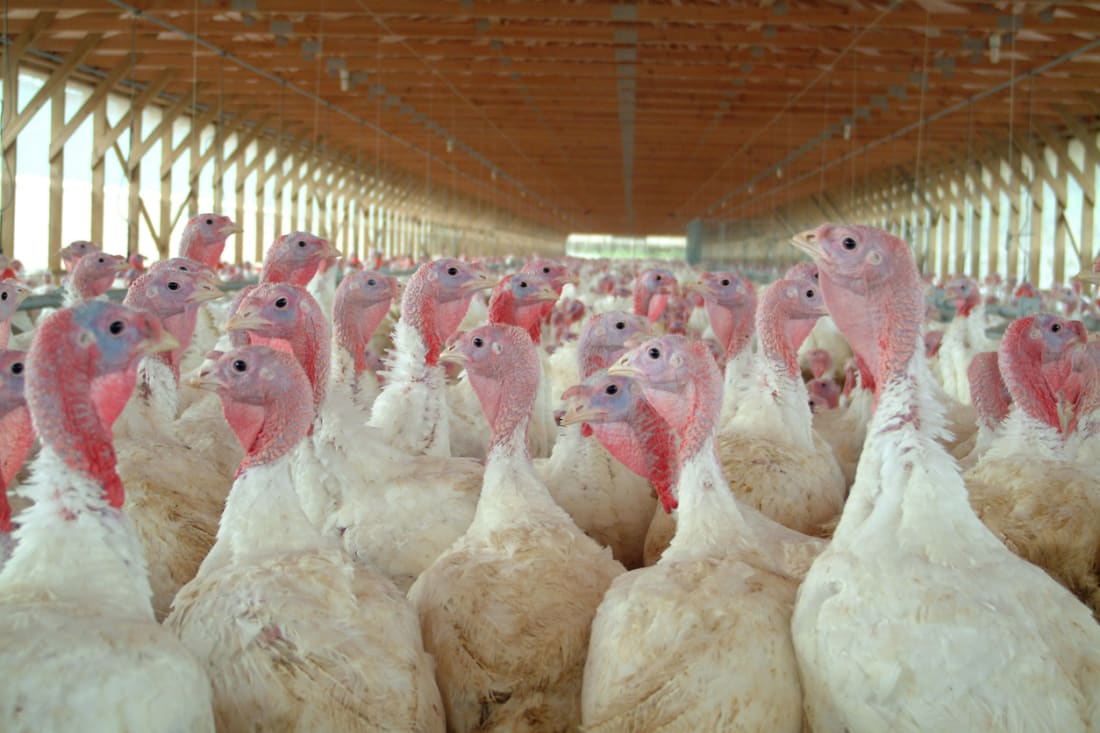|
 |
Photo by iStock/ene
Supermarket chains paid a lot more for Thanksgiving turkeys this year. Wholesale prices for whole turkeys surged 75% between October 2024 and October 2025 due to tight supply. But because grocery stores often loss lead on Thanksgiving turkeys to compete for the rest of your holiday shopping list, only some shoppers paid more for their ceremonial bird (some even paid less).
Whether or not you felt the impact of this year’s tight turkey market, the wholesale price spike exposes concerning vulnerabilities in our concentrated food supply chain. The size of the U.S. turkey flock is at a nearly 40-year low after a bird flu outbreak earlier this year hit turkey farms hard. While not as concentrated as other meat industries, a few large farms raise most U.S. turkeys. According to the latest agricultural census in 2022, just 834 large farms raised approximately 70% of all turkeys in the U.S. The largest turkey farms house nearly 300,000 turkeys.
Such consolidation exacerbates the risk of a bird flu outbreak, because if just one turkey tests positive for bird flu on a farm, the entire flock must be killed to control the infection. Since the beginning of the latest bird flu epidemic in 2022, the largest 5.5% of turkey farm outbreaks accounted for 19% of all turkeys killed due to bird flu. More dispersed production would be more resilient, as one infection would not have as large an impact.
Turkey farms are consolidated, in part, to meet the large production expectations of even more consolidated turkey processors. The three largest turkey processors, Cargill, Hormel, and Butterball, control roughly half of the turkey market. Packer consolidation presents its own risks to farmers and consumers, as dominant turkey processors have been accused of colluding to fix prices. Major processors Tyson and Cargill paid $4.6 million and $32 million, respectively, to settle these price-fixing lawsuits.
In 2019, a class of grocery wholesalers sued turkey processors for allegedly conspiring with the help of a data-sharing services, Agri Stats, to cut back turkey production and raise prices. Before 2009, turkey production generally tracked with changes in wholesale turkey prices and feed costs, but starting around 2010, turkey production fell and prices “spiked to an unprecedented level,” one lawsuit said. From 2000 to 2009, the average wholesale price for a turkey hen ranged between $0.55 and $0.85 per pound, according to USDA data. Starting around 2010, the price steadily rose every year, reaching $1.15 per pound in 2016, a 35% increase from 2009. Turkey production was also below the 2000-2008 average each year between 2009 and 2018, the alleged conspiracy period. Agri Stats stopped producing turkey reports in 2019 (some claim as a result of antitrust litigation).
Ten turkey processors representing approximately 80% of the industry could allegedly coordinate industry-wide production cuts because Agri Stats provided them detailed, timely information on competitors’ production levels and pricing. Agri Stats also advised turkey processors on how to maximize profits and allegedly discouraged processors from cutting prices or taking sales from one another. The Department of Justice sued Agri Stats for illegal anticompetitive information sharing among turkey processors, chicken processors, and hog processors. These claims survived a motion to dismiss, and litigation is ongoing.
New Policy Brief on Grocery Affordability and Fair Markets
The Open Markets Institute released a new expert brief outlining how policymakers at all levels of government have levers at their disposal to hold dominant food corporations to account and create fair, affordable grocery prices for everyone.
Decades of unchecked mergers have decimated competition and consolidated control over food production in the hands of a few large corporations. In addition to breaking up consolidation and preventing illegal mergers, this brief details the antitrust and other laws policymakers can use to address corporate practices that drive up prices.
What We’re Reading
Egg producers are caught up in their own price-fixing scandal involving a different data analytics firm, Urner Barry. Last week, groups of consumers and restaurants brought new class-action lawsuits alleging that corporations such as Cal-Maine and Rose Acre abused the Urner Barry price index to drive up egg prices higher than expected following bird flu outbreaks. (Reuters)
Tyson will close a beef plant in Lexington, NE, that employs 3,200 people in a town of just 11,500. (Nebraska Examiner)
A Kroger produce buyer recently pled guilty to accepting more than $147,000 in kickbacks from produce vendors in exchange for disclosing the highest prices Kroger was willing to pay. (Supermarket News)
More than 300 Big Ag lobbyists participated in COP30 this year, the annual UN climate summit. That’s more Big Ag lobbyists than Canada or India’s entire COP30 delegation. (The Guardian)
The federal funding package that ended the government shutdown included a provision that undermines states’ ability to sue large food companies for misleadingly labeling high-sugar foods as “healthy.” (Civil Eats)
Follow F&P on Twitter | Subscribe to this Newsletter | F&P Website | Contact Us
Food & Power is a free publication of the Open Markets Institute. If you enjoyed this post and want to support our work, you can donate to Open Markets. Thank you!

